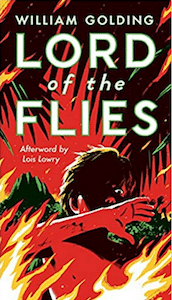Fabulous Lord of the Flies Quotes!
If you haven’t read Lord of the Flies, you can just read these choice quotes from author Tania Runyan, and you’ll have a pretty good sense of the heart of the book.
Of course, then you wouldn’t have read Lord of the Flies, and we have to tell you that it’s quite worth reading. Not to write a paper. Or figure out the symbols. Or describe the characters. Or any of those tasks. (Been there, done that.)
It’s just a really, really good read.
Not an easy read, by any means. Hard things happen. Friendships are tested. Bizarre stuff goes on (hey, these are choir boys suddenly left on their own to make it under jungle-like conditions!). And, oddly, through it all, there is a lyric beauty to William Golding’s (the author’s) words. That might be one of the most unexpected aspects of the book.
We suggest you enjoy the story and pull your own favorite quotes. Just because. If you have to analyze them later, you’ll have an easier time because you let yourself simply enjoy the story first. (If you haven’t experienced the book yet, proceed with caution through the following quotes. There are definitely spoilers!)
(And, if you’re wondering, btw, who Tania Runyan is, she’s the author of How to Read a Poem: Based on the Billy Collins Poem Introduction to Poetry and How to Write a Poem. She’s also written some Lord of the Flies poems herself and offered prompts to go along.)
And Now…10 Lord of the Flies Quotes, With Page Numbers
1. “Like kids!” [Piggy] said scornfully. “Acting like a crowd of kids!” (38)
2. “You got your small fire all right.” (44)
3. Again he fell into that strange mood of speculation that was so foreign to him. If faces were different when lit from above or below–what was a face? What was anything? (78)
4. Simon became inarticulate in his effort to express mankind’s essential illness. (89)
5. Percival Wemys Madison, of the Vicarage, Harcourt St. Anthony, lying in the long grass, was living through circumstances in which the incantation of his address was powerless to help him. (94)
6. The ground was turned over near the pig-run and there were droppings that steamed. Jack bent down to them as if he loved them. (111)
7. [Jack] sized them up. Each of them wore the remains of a black cap and ages ago they had stood in two demure rows and their voices had been the song of angels. (133)
8. At last Simon gave up and looked back; saw the white teeth and dim eyes, the blood—and his gaze was held by that ancient, inescapable recognition. (138)
9. Softly, surrounded by a fringe of inquisitive creatures, itself a silver shape beneath the steadfast constellations, Simon’s dead body moved out toward the open sea. (154)
10. A semicircle of little boys, their bodies streaked with colored clay, sharp sticks in their hands, were standing on the beach making no noise at all. (200)
Bonus Quote
11. And in the middle of them, with filthy body, matted hair, and unwiped nose, Ralph wept for the end of innocence, the darkness of man’s heart, and the fall through the air of the true, wise friend called Piggy. (202)
Choose Your Own Quotes
We’d love to hear your favorite quotes from the book. Just drop them into the comment box below!
Poetry Prompt
Write a found poem using some of the quotes we’ve provided. Or choose your own set of quotes from the book and arrange them in new ways to create a poem. (See some cool Lord of the Flies found poems samples here.)
Photo by Marc Veraart, Creative Commons, via Flickr. Post by L.L. Barkat and Tania Runyan.
_______

How to Write a Poem contains 3 essential elements I’ve yet to find in one poetry-writing text: generous and informed instruction, dozens of compelling example poems, and rich and plentiful exercises that avoid tricks and gimmicks.
Any poetry-writing teacher would do well to assign this text. Any writer would do well to draft and revise poems based upon these prompts.”
—Nathaniel L. Hansen; Assistant Professor of English & Creative Writing, University of Mary Hardin-Baylor; Director, Windhover Writers’ Festival
- Poetry Prompt: In the Wild Secret Place - January 6, 2025
- Journeys: What We Hold in Common - November 4, 2024
- Poetry Prompt: My Poem is an Oasis - August 26, 2024


Rick says
I have been so perplexed as to why Golding would write a tale of such horror, arising from the fire of innocence, using so much exquisite language.
The passage that begins the chapter “Beast from Air.” The beast is said to be a sign from the world of grown-ups. The beast descends on the island unseen, and takes its position high among the “shattered rocks on the mountain top.” There the beast, alternately drawn and loosed by parachute cords, gave a semblance of something living. This was the sign Ralph longed for in the preceding chapter.
LOTF is a tale confounded by its telling.
L.L. Barkat says
I was rethinking that part, Rick, and I think it’s quite purposeful—the voice of the text paralleling the beauty of the choir boys’ voices and, therefore, the undeniable beauty of mankind even in his ugliness.
So there’s tension. Which makes this more than a straightforward tale of horror or a categorical statement about the complete nature of mankind. As I recall, Nature herself has this same duality going on in the text.
Not sure where that leaves us. 🙂
Rick says
It was purposeful indeed. Writing like that does not spill out unintentionally.
And nature?— here in Texas I can attest to nature’s fickle ways. The first day we watched it accumulate. So beautiful! Something to see for those of us raised in northern climates (Ohio for me).
But then nature’s indifference kicked in. What Nature is (beautiful and terrifying) Nature does not know in spite of how we perceive it.
They were dirty, not with the spectacular dirt
of boys who have fallen into mud
or been brought down hard on a rainy day.
Not one of them was an obvious subject for a shower,
and yet—hair, much too long, tangled here and there,
knotted round a dead leaf or a twig; faces cleaned fairly
well by the process of eating and sweating but marked
in the less accessible angles with a kind of shadow;
clothes, worn away, stiff like his own with sweat, put on,
not for decorum or comfort but out of custom;
the skin of the body, scurfy with brine—
He discovered with a little fall of the heart
that these were the conditions he took as normal now
and that he did not mind. He sighed
and pushed away the stalk from which he had stripped the fruit.
Already the hunters were stealing away to do their business
in the woods or down by the rocks.
He turned and looked out to sea.
Normalization is something we have all recently lived through—still living through. This is exemplified in the above passage. The passage ends with a common action by us humans—to turn away ultimately from that which we consider not beautiful. Ralph did it here and the officer of the rescue did the same when Ralph finally broke into sobs and the officer realized this was not “fun and games,” was not Coral Island, and he was disappointed in his “British boys” not putting up a better show.
lynn__ says
Ralph’s Legacy
(a found poem)
Like kids acting
like a crowd of kids
got small fire all right,
again that strange mood
of speculation so foreign;
when lit from above or
below–what was a face?
Inarticulate in effort
to express mankind’s
essential illness, living
through circumstances
in which incantation
was powerless to help.
Ground was turned over
near the pig-run and
droppings that steamed
(bent down as if loved them
and sized them up… )
at last, gave up and
Looked back; saw the
white teeth and dim eyes,
the blood—and gaze held by
ancient, inescapable recognition
softly surrounded by a fringe
of inquisitive creatures, silver
beneath the steadfast constellations.
A semicircle of little boys,
bodies streaked with colored clay,
sharp sticks in their hands, standing
on the beach making no noise at all,
and in the middle, (he) wept
for the end of innocence, the
darkness of man’s heart, and the fall.